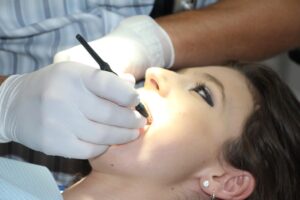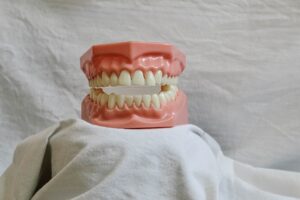Experts estimate that 70% of the population suffers from bruxism, meaning 7 out of every 10 people. One of the primary factors for this rise could be the COVID-19 pandemic and the accompanying stress and anxiety it has generated since its onset in Spain.
Since the beginning of the pandemic, orthodontic clinics have observed an increase in bruxism cases, as emotional stress and sleep disorders lead many people to grind and clench their teeth more frequently.
In this article, I would like to explain the symptoms and treatments for bruxism.
What is Bruxism?
Bruxism is defined as a non-functional movement of the jaw, including unconscious clenching, grinding, clicking, and gnashing of teeth during sleep. It is a parafunctional activity, unrelated to normal functions like eating or speaking.
The most common symptoms associated with bruxism include:
- Headaches
- Pain in the jaw, neck, and ear muscle
- Tooth wear and/or loss
- Damage to dental restorations (e.g., crowns and fillings)
- Erosion of tooth enamel
- Tooth sensitivity
- Changes in bite alignment
Severe bruxism can also lead to Temporomandibular Joint (TMJ) disorder.
What is the Temporomandibular Joint (TMJ)?
The Temporomandibular Joint (TMJ) consists of the bones, muscles, ligaments, intra-articular meniscus, and joint capsule that enable mouth movements such as opening and closing.
These joints, located on either side of the face in front of the ears, connect the jaw to the skull and facilitate actions like chewing, speaking, and swallowing.
TMJ dysfunction occurs when the muscles and ligaments surrounding these joints become inflamed, irritated, or when the meniscus is displaced from its typical position. The condition can be acute or chronic, with pain ranging from mild to severe.
Symptoms of Bruxism
Symptoms can initially be minimal, often without the patient being aware of the condition. Over time, however, teeth may begin to wear down and shorten. Bruxism can also impact the TMJ, causing discomfort and functional issues.
Occasional clenching or grinding is generally not problematic, but regular instances may indicate bruxism.
Types of Bruxism
Bruxism primarily occurs during sleep, although it can also happen while awake. Depending on when it occurs, it is classified as either daytime or nighttime bruxism.
– Waking Bruxism: Also known as daytime bruxism, this involves clenching and grinding the teeth during waking hours. One of the main risk factors is stress, often related to emotional challenges. Individuals can sometimes notice and stop this clenching. In many cases, awareness and stress reduction are sufficient, and specific treatment may not be necessary.
– Sleep Bruxism: Formerly called nocturnal bruxism, this occurs when clenching and grinding happen unconsciously during sleep, particularly in stages 2 and 3 of non-REM sleep.
Treatments for Waking and Nocturnal Bruxism
While there are no medications to stop jaw clenching or teeth grinding, there are ways to mitigate it, reduce its frequency, and protect the teeth and jaw from damage.
Identifying the cause of bruxism is essential for effective treatment.
Treatment for Waking Bruxism
As stress is a common cause of daytime bruxism, managing stress is a primary recommendation. Some ways to reduce stress include:
- Limiting certain beverages like alcohol, caffeine, and soft drinks, as these can increase tension rather than calm it
- Practicing meditation
- Avoiding chewing on objects like pencils or pens
- Engaging in regular exercise
- Undergoing orthodontic treatments to correct dental alignment
Treatment for Sleep Bruxism
For sleep bruxism, it’s essential to consult a specialist in bruxism and TMJ to determine the cause and discuss appropriate treatments.
The goal is to limit damage to the teeth and especially the TMJ. Treatment may include behavioral techniques, conservative methods, intra-articular injections, arthrocentesis, arthroscopy, open surgery, or in certain cases, the placement of a TMJ prosthesis.
At Clínica Birbe, I start with conservative treatments. If these are not sufficient, we progress to more advanced options like injections (arthrocentesis), closed surgery (arthroscopy), or, in specific cases, open surgery. Initial conservative treatments include:
- Eating soft foods
- Avoiding nail-biting and gum chewing
- Applying heat to painful areas
- Practicing relaxation techniques to control jaw tension, such as biofeedback or meditation
In addition, conservative approaches may involve cranial physiotherapy, relaxation techniques, and the use of a night guard to alleviate symptoms.
Bite Guards
Bite guards are custom-made mouthpieces that protect the teeth from grinding and support the TMJ. Worn during sleep, they prevent clenching, protect the teeth, and help realign the jaw. Although they don’t cure bruxism, bite guards improve sleep quality and reduce some symptoms associated with clenching and grinding.
Regular follow-ups are recommended to ensure the bite guard is working effectively.
Symptom Relief
A dentist or physician may prescribe pain relievers, anti-inflammatories, or muscle relaxants to manage pain. Studies also show that botulinum toxin injections can provide significant relief from jaw pain and other issues associated with bruxism. While botulinum toxin is not a cure, it helps reduce pain and the intensity of clenching.
Surgical Treatment
Surgical treatment is only recommended when other methods have proven ineffective, and it is used in a minority of cases.
If you suspect you may have bruxism, it’s essential to learn techniques to relax the jaw muscles and avoid clenching and grinding whenever possible. One approach is to train yourself to relax your jaw by placing your tongue gently between your upper and lower teeth.
It’s highly advisable to visit a dentist or orthodontic specialist to determine if you have bruxism and receive appropriate guidance to avoid further damage.
If you’d like to know which treatment might be most suitable for you, feel free to contact us at clinica@birbe.org, call us at +34 93 212 47 37, or reach out via WhatsApp at +34626852363. I’ll be happy to assist and advise you!
Article written by the Birbe Editorial Committee



